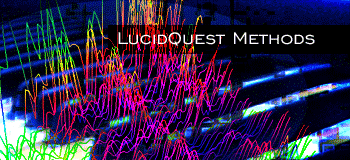Four Brainwave States |
||||
 |
|
|
 | |||||||||||||||||||||||||||||||||||
|
||||||||||||||||||||||||||||||||||||||||||||||
| LQ uses combinations of rhythmic, binaural, and algorithmic methods to deliver soundscape experiences which offer an intense and effective entrainment experience.. | ||||||||||||||||||||||||||||||||||||||||||||||
|
As you read, billions of neurons fire on and off in your brain while communicating the experience of your consciousness. When each of these electrical firings is detected as a whole, a "wave" effect is observed. These cumulative electrical rhythms are referred to as "brain waves". By using an electroencephalograph (EEG), one can detect electrical brainwave signals over the scalp. Brainwaves are recognized, within subcategories, while monitoring the brain's electrical activity as it engages in any activity. For example: while sleeping dreamlessly, your brainwaves take on slower rhythms than when you are aware and awake. To learn more, read the conditions of the 4 brainwave states below...
|
|
|||||||||||||||||||||||||||||||||||||||||||||